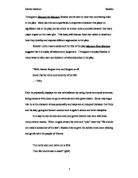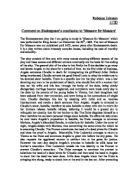However, this proposal does not quite compliment Isabella’s chastity, as her silence at the request suggests compliance and she seems to forget her religious stance in the face of this figure of power. From Act 3 onwards, with the introduction of the bed trick, it seems Isabella’s chastity and virtue are drained, as she feels this deceitful trick will grow to a “most prosperous perfection”, yet it seems she is willing to sacrifice Marianna’s chastity and not her own.
This raises the issue of Isabella’s mercy and it is here I feel this second quotation is flawed. When faced with Angelo’s threats: “thy unkindness shall his life draw out”, my false o’erweighs your truth”, and “who will believe thee Isabel?”, Isabella is absolutely adamant in her position. “More than our brother is our chastity”. It seems that these two essentially moral qualities of virtue and “chastity” have compromised another moral quality: “mercy” for Claudio, her own brother. Although we cannot ignore that her previous pleas in Act Two to Angelo: “O spare him! Spare him!” in desperation, “tis tyrannous to use it like a giant”, and her agitated: “man, proud man” who “makes the angels weep”, does arise from pity and a desire for mercy for her brother. It would now seem Isabella champions mercy, however when it comes to her own brother she does not show it in practice.
This idea of “mercy” is inter-related to the claim that Isabella is “too pious and too proud”, as we perceive the “fault” that arises from this extreme nature is a lack of “mercy”. In Act Three, as Isabella goes to visit her brother, Claudio cries out to her from the depths of his soul: “let me live”, “death is a fearful thing” and his fear is acutely enhanced by his dread of the “thrilling thick-ribbed region of ice” or hell after death. This is a plea of raw emotion and the audience are shocked by Isabella’s harsh and cold reaction: “O you beast!” and she suggests he is not his father’s son for his cowardice. She fails to understand and show mercy for Claudio’s own human desire for life, and rebukes him very harshly, suggesting she is too pious and too proud. Furthermore, as Isabella asserts in her soliloquy that had Claudio “twenty heads” he would give them all up on “twenty bloody blocks”, suggesting she is too pious and proud, encapsulated brilliantly in “more than our brother is our chastity”; her pride sacrifices her mercy and love for her brother.
Yet must this be considered a “fault” of Isabella? Her pious and proud nature certainly seem morally superior to the “corruption” and promiscuity evident in Vienna. Characters such as Pompey the “bawd”, Mistress Overdone or “Madam Mitigation”, and the comic, yet morally devoid Lucio. Isabella speaks as wishing “a more strict restraint”, in order to preserve her chastity and virtue, and we certainly respect her more than these low-life characters. In fact this excessive piety is an aspect of her virtuous character and therefore not a “fault”. As she pleads with Angelo in Act Two, Scene Two: “Go to your bosom; knock there” and to “ask your heart what it doth know” is “a natural guiltiness”, we do not feel that this piety is too excessive, nor that she is overly proud. The audience respect her later refusal of Angelo: “keen whips I’d wear as rubies…..ere I’d yield my body up to shame”. Although this does have a rather proud tone to it, I feel the audience respects this moral standing, and does not feel it excessively proud.
Additionally, after her meeting with the Duke, in Act Three, it is almost as if he drains the vigour and energy in Isabella that the audience has so admired. She says: “I am directed by you”, certainly not the words of an excessively proud woman, nor does her participation in the bed-trick particularly uphold her piety, virtue or chastity. In fact, it seems with the Duke’s introduction to Isabella, these two views become distorted. There is something sordid in how she tells the Duke, she showed Angelo “the way twice over”, and we do wonder if Mariana will really be “advantaged” in this plot, as she will be married to “this outward-sainted deputy” who does not really love her. Her chastity and virtue seem less prominent now, but she is learning “mercy” for others by saving her brother and now in the Duke’s control Shakespeare presents her as less pious and proud, certainly not excessively so. In Act Five a glimpse of her previous character returns, as she plays on Angelo’s word “strange”, using it to call him an “hypocrite” and a “virgin-violator”; thus we are reminded of her chaste and virtuous nature. Furthermore, her mercy is now evident as she begs for Angelo’s life at Mariana’s pleas: “good men are made out of faults” and has learnt to respond to this raw emotion, that previously in Act Three she showed no mercy for in Claudio. She asserts Angelo merely had “intents”, pitying him and showing mercy. Yet with this new quality, her old quality of chastity seems to be sacrificed, as she will now marry the Duke, indicated by her silence.
Shakespeare thus presents a change in Isabella, originally a symbol for chastity and virtue, but lacking mercy and often seeming excessively proud and pious. Yet as her dealings with other characters progress, most particularly the Duke’s influence, her excessive qualities subside, and her virtue still evident, she has gained a merciful quality. Shakespeare thus presents Isabella in a journey of understanding, learning that the strict setting of the nunnery is not in fact the best moral learning ground, but actually she can exercise her morals in the real world of experience, without compromising her virtue.







